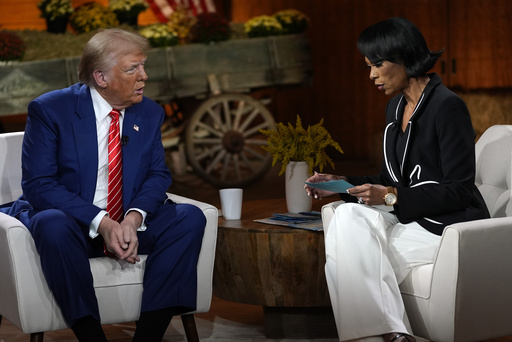
NEW YORK — The recent interview of Kamala Harris by Bret Baier on Fox News Channel highlights a shift in strategy among Democrats, as they increasingly opt to engage with a network that has a reputation for favoring Donald Trump.
Since the Democratic convention held in August, there has been a noticeable uptick in the appearances of Democratic figures on Fox, with about twice as many appearances compared to the same period during President Joe Biden’s 2020 campaign. This marks a contrast to Hillary Clinton’s campaign in 2016, when she engaged with the network far less frequently.
Discussions within the Democratic Party regarding whether to bypass Fox or to take advantage of the platform to potentially alter viewers’ opinions have been ongoing. While Biden refrained from making any specific Fox appearances in his campaign, Clinton had two brief forays onto the network, one during the primary and another in the summer of 2016.
Ian Sams, a spokesman for Harris’s campaign, articulated their approach, stating, “The vice president, Governor Walz and our campaign believe it is important to speak to all Americans, wherever they are getting their information or entertainment, so they can hear directly from us — not through a filter.”
The trend of Democrats appearing on Fox has not gone unnoticed, particularly by Trump himself, who commented on social media about Sams being overly present on the channel. Trump suggested that it is unproductive to engage in interviews on Fox, asserting that they have “lost their way” in recent times.
Coinciding with Harris’s interview, Trump himself appeared on Fox for a pre-recorded town hall aimed at women voters, hosted by Harris Faulkner. Meanwhile, Harris’s running mate, Tim Walz, has made consecutive appearances on “Fox News Sunday,” which airs across both broadcast and cable networks. Bream, the show’s host, expressed surprise when the Democratic campaign initiated contact for his recent slot.
In earlier campaign activities, Transportation Secretary Pete Buttigieg has been vocal on Fox, even introducing himself in a speech by referencing his frequent appearances on the network. Other notable Democrats like California Governor Gavin Newsom, Pennsylvania Governor Josh Shapiro, and Representatives Jared Moskowitz and Ro Khanna have also participated in various discussions on Fox.
However, these Democratic appearances predominantly occur during daytime segments or weekends, seldom encroaching into the prime-time slots traditionally held by more partisan hosts such as Laura Ingraham, Sean Hannity, and Greg Gutfeld.
In this complex media landscape, Dan Pfeiffer, who previously served with President Obama, commented on the merits of Democrats engaging in such challenging environments, suggesting that it can effectively capture attention from more moderate or undecided voters.
Furthermore, Fox News maintains that a significant portion of its viewership comprises independents and Democrats—opinion that takes root from the network’s broader audience metrics, which reportedly outstrips that of CNN and MSNBC combined in key swing states, aside from Nevada.
As for Harris’s experience during the Baier interview, Baier, known for his probing style, faced a dual challenge: to ask tough questions while also being mindful of his audience’s preferences. He recently attempts to assuage concerns among Fox viewers about the nature of the upcoming interview, reiterating that no one but himself would possess the questions beforehand. Concerns regarding the potential editing of the interview were also addressed, as Baier confirmed the show would air in its entirety immediately after the recording session.
As the political landscape evolves, the willingness of Democrats to step into the spotlight of a network often perceived as adversarial reflects broader strategic shifts as they seek to connect with a diverse audience.

